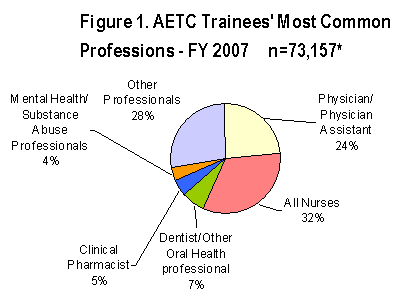| On this page... | AETC Provider Training Network... | ||||
| Background | AETC National Resource Center | ||||
| Provider Training | National HIV/AIDS Clinicians' Consultation Ctr. | ||||
| About the National Centers | Warmline - 800-933-3413 | ||||
| Regional AETCs | PEPline - 888-448-4911 | ||||
| Funding | Perinatal Hotline - 888-448-8765 | ||||
| National Minority AETC | |||||
| AETC Publications... | National AETC Evaluation Center | ||||
| Download
AETC publications (government- and
grantee-produced) from the AETC
National Resource Center. |
International Training and Education Center on HIV | ||||
| Background |
|
The AIDS Education and Training Centers (AETC) Program of the Ryan White HIV/AIDS Program supports a network of 11 regional centers (and more than 130 local associated sites) that conduct targeted, multidisciplinary education and training programs for health care providers treating people living with HIV/AIDS. The AETCs serve all 50 States, the District of Columbia, the Virgin Islands, Puerto Rico, and the 6 U.S. Pacific Jurisdictions. The AETC Program increases the number of health care providers who are effectively educated and motivated to counsel, diagnose, treat, and medically manage people with HIV disease, and to help prevent high-risk behaviors that lead to HIV transmission. |
| TOP |
| Provider Training |
Training
is targeted to providers who serve
minority populations, the homeless,
rural communities, incarcerated persons,
and Ryan White HIV/AIDS Program–funded
sites. AETCs focus on training primary
health care clinicians (physicians,
physician assistants, nurses, nurse
practitioners, dentists, pharmacists);
training activities are based on assessed
local needs. Emphasis is placed on
interactive, hands-on training and
clinical consultation to assist providers
with complex issues, including those
related to the management of highly
active antiretroviral therapy. AETCs
collaborate with other Ryan White–funded
organizations, Area Health Education
Centers, community-based HIV/AIDS
organizations, and medical and health
professional organizations. During
the 2006–2007 grant year, more
than 128,000 participants attended
AETC training events. Clinicians trained
by AETCs have been shown to be more
competent with regard to HIV issues
and more willing than other primary
care providers to treat people with
HIV disease. [D] |
| TOP |
| About the National Centers |
|
Several national, cross-cutting AETC components support and complement the regional training centers, as follows:
HRSA/HAB also supports the International
Training and Education Center on
HIV |
| TOP |
| Listing of Regional Centers |
|
See a map-based listing of the regional AETCs
|
| TOP |
| Funding |
| The FY 2008 appropriation for the AETC program is $34.1 million. |
| TOP |

